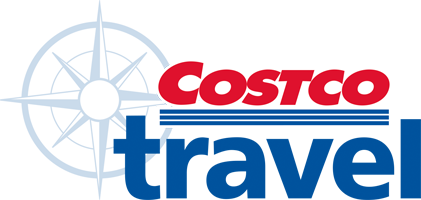
South America: Amazon Explorer Cruise
Holland America Line
Trace Caribbean isles to Brazil. Call on charismatic cities along the banks of the mighty Amazon. Explore the spectacular Amazon rainforest on a Manaus overnight.

Executive Member Benefit
Executive Members receive an annual 2% Reward, up to $1,250, on qualified Costco Travel purchases
Digital Costco Shop Card
Member Exclusive: Digital Costco Shop Card with every Holland America Line sailing†
Sailing Itinerary

Note: Cruise itineraries are subject to change. Please verify ports and times directly with the cruise line.
Overview
Fort Lauderdale is a city on Florida's southeastern coast, known for its beaches and boating canals. The Strip is a promenade running along oceanside highway A1A. It's lined with upscale outdoor restaurants, bars, boutiques, and luxury hotels. Other attractions include the International Swimming Hall of Fame, with pools and a museum of memorabilia, and Hugh Taylor Birch State Park, featuring trails and a lagoon.
Overview
Philipsburg is the capital of St. Maarten, the Dutch side of the Caribbean island St. Maarten. Beachfront bars line the boardwalk along Great Bay. Voorstraat, or Front Street, has duty-free shops and casinos. The St. Maarten Zoo is home to parrots, monkeys, and a playground. St. Maarten Museum displays artifacts from the indigenous Arawak people. The ruins of 17th-century Fort Amsterdam stand on a nearby peninsula.
Overview
Castries is the capital and largest city of Saint Lucia, an island country in the Caribbean. The quarter with the same name had a population of 70,000 on 22 May 2013 and stretches over an area of 80 km2. Castries is in a flood gut and is built on reclaimed land. It houses the seat of government and the head offices of many foreign and local businesses. The city's design is in a grid pattern. Its sheltered harbor receives cargo vessels, ferry boats, and cruise ships. It houses duty-free shopping facilities such as Point Seraphine and La Place Carenage. Many restaurants offer menus from local to Chinese. Supermarkets and other shopping facilities provide goods. The city is well served by a bus system and taxi service.
Overview
On this island of tropical palm-fringed beaches, there's an ambiance that ranges from sophisticated (in Bridgetown) to slow-paced. Enjoy an exciting tour of Harrison's cave, filled with underground streams, thundering waterfalls, stalactites, and stalagmites.
Overview
Ile du Diable, Devil's Island, off the coast of French Guiana, is one of the three Iles du Salut (Islands of Salvation or Health), so named because they provided a more healthy environment than the mainland for the French gold seekers of the 1760s. The other two are Ile St. Joseph and Ile Royale, separated from Devil's Island by a vicious tide. In later years, Ile du Diable became part of the prison system developed in French Guiana. Other locations were on the mainland, and the other two islands, but over time, the entire penal colony was called Devil's Island.
Overview
Sail along an area of Brazil known as Barra Norte, or North Bar. Barra Norte is then often divided into two areas.
Overview
The Amazon River and Flooded Forests ecoregion contains an extremely high number of freshwater animal species, including two species of freshwater dolphins. The ecoregion is characterized by extensive forested areas that become flooded during each rainy season. These "flooded forests" in the Amazon region are the most extensive of this habitat type in the entire world. The cycle of flooding, and the annual regeneration that it produces, represent a globally outstanding ecological phenomenon. The entire Amazon basin contains the largest number of freshwater fish species in the world, estimated at more than 3,000 species. Every year the Amazon River rises more than 30 feet (9 m) and floods surrounding forests. These rising waters replenish nutrients in floodplain areas and regenerate floodplain lakes, floating meadows, and other seasonal habitats. Freshwater fish move into these flooded forests and often feed on the fruits that drop from the trees. The Amazon is the second longest river in the world (after the Nile), stretching 4,000 miles (6,400 kilometers). But it's the largest when it comes to volume. The Amazon contains 20 percent of the Earth's freshwater, which it carries from high up in the Andes Mountains to the Atlantic Ocean. Along the way, it picks up rich soil that flows into dozens of streams and small rivers. The Amazon Basin has two freshwater systems, the igapó (blackwater) and the varzea (whitewater). The area contains a large number of minerals that fertilize land and help trees and other vegetation grow.
Overview
The Amazon River and Flooded Forests ecoregion contains an extremely high number of freshwater animal species, including two species of freshwater dolphins. The ecoregion is characterized by extensive forested areas that become flooded during each rainy season. These "flooded forests" in the Amazon region are the most extensive of this habitat type in the entire world. The cycle of flooding, and the annual regeneration that it produces, represent a globally outstanding ecological phenomenon. The entire Amazon basin contains the largest number of freshwater fish species in the world, estimated at more than 3,000 species. Every year the Amazon River rises more than 30 feet (9 m) and floods surrounding forests. These rising waters replenish nutrients in floodplain areas and regenerate floodplain lakes, floating meadows, and other seasonal habitats. Freshwater fish move into these flooded forests and often feed on the fruits that drop from the trees. The Amazon is the second longest river in the world (after the Nile), stretching 4,000 miles (6,400 kilometers). But it's the largest when it comes to volume. The Amazon contains 20 percent of the Earth's freshwater, which it carries from high up in the Andes Mountains to the Atlantic Ocean. Along the way, it picks up rich soil that flows into dozens of streams and small rivers. The Amazon Basin has two freshwater systems, the igapó (blackwater) and the varzea (whitewater). The area contains a large number of minerals that fertilize land and help trees and other vegetation grow.
Overview
MACAPA, on the north bank of the Amazon and right on the equator, is the gateway to the state of Amapá and home to three-quarters of its population. Surrounded by uninhabited forests and hills, it dominates the northern section of the Amazon estuary. If you're coming by ferry from Belém you'll arrive to the southwest at Porto do Santana, just twenty minutes by bus or an hour by boat from Macapa, though it lies on the other side of the equator. The airport is 4km from town on Rua Hildemar Maia (tel 096/223-2323). The Rodoviaria faces the Policia Tecnica, 5km outside town on the BR-156; from there, local buses run to Praça Veiga Cabral in the ccenter The countryside around Macapá is, like the Ilha do Marajó in the estuary, roamed by large herds of water buffalo. In town, there is not a great deal to do. The highlight is the Fortaleza de São José (daily8 am6 pmpm), one of the largest colonial forts in Brazibuilt-in in 1764 out of material brought over as ballast in Portuguese ships, in response to worries that the French had designs on the north bank of the Amazon. It is often closed, but nobody will mind if you slip through the enormous main gates for a stroll along the battlements. There's an interesting daily artisan market nearby on Canal da Fortaleza, and you could spend some more time checking out the eighteenth-century Igreja São José de Macapá on the Praça Veiga Cabral and the Museu Histórico at Av. Mario Cruz 17 (Tues-Sun 8 am-noon & 6 pmpm). There's also a small private museum, the Instituto de Estudos e Pesquisas de Plantmedicinaisais (IEPA) at Av. Feliciano Coelho 1509, holding the Valdemiro Gomes collection of minerals, Amazon woods, and medicinal plants.
Overview
The city of Santarem is located between two great rivers, the Amazon and the Tapajos. It is there that the meeting of the green-emerald waters of the Tapajós with the brown waters of the Amazon occurs. From the moment they meet the rivers run together for a good time without mixing. 710 kilometers from Belém, Santarém offers a variety of tourist attractions. The access is easy. There the tourist can enjoy the beauty of the Alter-do-Chão beach, bathed by the crystal clear waters of the Tapajós. Fishing is one of the most popular attractions of Santarem, especially fishing the tucunare.
Overview
This small village on the mouth of the Valeria River, a tributary of the Amazon, is the home of around 75 "ribeirrinhos" or river people. Here, you'll have the opportunity to see how they live, shop for handmade crafts and to wander through the village.
Overview
MANAUS is the capital of Amazonas, a tropical forest state covering around one and a half million square kilometres. It is also the commercial and physical hub of the entire Amazon region. Most visitors are surprised to learn that Manaus isn’t actually on the Amazon at all. Rather it lies on the Rio Negro, six kilometres from the point where that river meets the Solimões to form (as far as Brazilians are concerned) the Rio Amazonas. Just a few hundred metres away from the tranquil life on the rivers, the centre of Manaus perpetually buzzes with energy: always noisy, crowded and confused. Escaping from the frenzy is not easy, but there is the occasional quiet corner, and the sights of the port, markets, Opera House and some of the museums make up for the hectic pace in the downtown area. In the port and market areas, where the infamous Porto do Manaus smell is inescapable, pigs and chickens line the streets and there’s an atmosphere which seems unchanged in centuries. For the Amazon hinterland, Manaus has long symbolized “civilization”. Traditionally, this meant simply that it was the trading centre, where the hardships of life in the forest could be escaped temporarily and where manufactured commodities to make that life easier could be purchased – metal pots, steel knives, machetes and the like. Virgin jungle seems further from the city these days – just how far really depends on what you want “virgin forest” to mean – but there are still waterways and channels within a short river journey of Manaus where you can find dolphins, alligators, kingfishers and the impression, at least, that man has barely penetrated. Indeed, most visitors to Manaus rightly regard a river trip as an essential part of their stay; there is a variety of jungle tour and lodge options. Even if you can’t afford the time to disappear up the Amazon for days at a stretch, however, there are a number of sites around Manaus that make worthwhile day excursions, most notably the meeting of the waters of the yellow Rio Solimões and the black Rio Negro, and the lily-strewn Parque Ecólogico Janauary. History The name Manaus came originally from the Manau tribe which was encountered in this region by São Luís do Maranhão, exploring the area in 1616. He called the spot São Luís del Rio. But it was Francisco do Motta Falco who really founded Manaus by building up the settlement and encouraging others to remain there with him. The city you see today is primarily a product of the rubber boom and in particular the child of visionary state governor Eduardo Ribeiro, who from 1892 transformed Manaus into a major city. Under Ribeiro the Opera House was completed, and whole streets were wiped out in the process of laying down broad Parisian-style avenues, interspersed with Italian piazzas centred on splendid fountains. In 1899 Manaus was the first Brazilian city to have trolley buses and only the second to have electric lights in the streets. Around the turn of the nineteenth century Manaus was an opulent metropolis run by elegant people, who dressed and housed themselves as fashionably as their counterparts in any large European city. The rich constructed palaces and grandiose mansions; time was passed at elaborate entertainments, dances and concerts. But this heyday lasted barely thirty years, and by 1914 the rubber market was collapsing fast; Ribeiro himself had committed suicide in 1900. There was a second brief boost for Brazilian rubber during World War II, but today’s prosperity is largely due to the creation of a Free Trade Zone, the Zona Franca, in 1966. Over the following ten years the population doubled, from 250,000 to half a million, and many new industries moved in, especially electronics companies. An impressive new international airport was opened in 1976 and the floating port, supported on huge metal cylinders to cope with variations of as much as 14m in the level of the river, was modernized to cope with the new business. Today, with over three million inhabitants, Manaus is an aggressive commercial and industrial centre for an enormous region the Hong Kong of the Amazon. Over half of Brazil’s televisions are made here and electronic goods are around a third cheaper here than in the south. All of this helps encourage domestic tourism – Manaus airport is crowded with Brazilians going home with their arms laden with TVs, hi-fis, computers and fax machines. The City It’s not hard to get used to the layout of the city, and most things of interest huddle close to the water. From the floating port where the big ships dock, riverboat wharves extend round past the market, from one end of Rua dos Andradas to the other. The busiest commercial streets are immediately behind, extending up to the Avenida Sete de Setembro, with the cathedral marking one end of the downtown district, the Praça da Polícia the other. Beyond Avenida Sete de Setembro, towards the Opera House, it’s a bit calmer, with more offices and fewer shops. The busy Praça da Matriz by the cathedral is the main hub of city communications, with buses to local points around the city and suburbs; another good connection point for city buses and taxis is the east side of Avenida Getúlio Vargas just north of Avenida Sete de Setembro.
Overview
MANAUS is the capital of Amazonas, a tropical forest state covering around one and a half million square kilometres. It is also the commercial and physical hub of the entire Amazon region. Most visitors are surprised to learn that Manaus isn’t actually on the Amazon at all. Rather it lies on the Rio Negro, six kilometres from the point where that river meets the Solimões to form (as far as Brazilians are concerned) the Rio Amazonas. Just a few hundred metres away from the tranquil life on the rivers, the centre of Manaus perpetually buzzes with energy: always noisy, crowded and confused. Escaping from the frenzy is not easy, but there is the occasional quiet corner, and the sights of the port, markets, Opera House and some of the museums make up for the hectic pace in the downtown area. In the port and market areas, where the infamous Porto do Manaus smell is inescapable, pigs and chickens line the streets and there’s an atmosphere which seems unchanged in centuries. For the Amazon hinterland, Manaus has long symbolized “civilization”. Traditionally, this meant simply that it was the trading centre, where the hardships of life in the forest could be escaped temporarily and where manufactured commodities to make that life easier could be purchased – metal pots, steel knives, machetes and the like. Virgin jungle seems further from the city these days – just how far really depends on what you want “virgin forest” to mean – but there are still waterways and channels within a short river journey of Manaus where you can find dolphins, alligators, kingfishers and the impression, at least, that man has barely penetrated. Indeed, most visitors to Manaus rightly regard a river trip as an essential part of their stay; there is a variety of jungle tour and lodge options. Even if you can’t afford the time to disappear up the Amazon for days at a stretch, however, there are a number of sites around Manaus that make worthwhile day excursions, most notably the meeting of the waters of the yellow Rio Solimões and the black Rio Negro, and the lily-strewn Parque Ecólogico Janauary. History The name Manaus came originally from the Manau tribe which was encountered in this region by São Luís do Maranhão, exploring the area in 1616. He called the spot São Luís del Rio. But it was Francisco do Motta Falco who really founded Manaus by building up the settlement and encouraging others to remain there with him. The city you see today is primarily a product of the rubber boom and in particular the child of visionary state governor Eduardo Ribeiro, who from 1892 transformed Manaus into a major city. Under Ribeiro the Opera House was completed, and whole streets were wiped out in the process of laying down broad Parisian-style avenues, interspersed with Italian piazzas centred on splendid fountains. In 1899 Manaus was the first Brazilian city to have trolley buses and only the second to have electric lights in the streets. Around the turn of the nineteenth century Manaus was an opulent metropolis run by elegant people, who dressed and housed themselves as fashionably as their counterparts in any large European city. The rich constructed palaces and grandiose mansions; time was passed at elaborate entertainments, dances and concerts. But this heyday lasted barely thirty years, and by 1914 the rubber market was collapsing fast; Ribeiro himself had committed suicide in 1900. There was a second brief boost for Brazilian rubber during World War II, but today’s prosperity is largely due to the creation of a Free Trade Zone, the Zona Franca, in 1966. Over the following ten years the population doubled, from 250,000 to half a million, and many new industries moved in, especially electronics companies. An impressive new international airport was opened in 1976 and the floating port, supported on huge metal cylinders to cope with variations of as much as 14m in the level of the river, was modernized to cope with the new business. Today, with over three million inhabitants, Manaus is an aggressive commercial and industrial centre for an enormous region the Hong Kong of the Amazon. Over half of Brazil’s televisions are made here and electronic goods are around a third cheaper here than in the south. All of this helps encourage domestic tourism – Manaus airport is crowded with Brazilians going home with their arms laden with TVs, hi-fis, computers and fax machines. The City It’s not hard to get used to the layout of the city, and most things of interest huddle close to the water. From the floating port where the big ships dock, riverboat wharves extend round past the market, from one end of Rua dos Andradas to the other. The busiest commercial streets are immediately behind, extending up to the Avenida Sete de Setembro, with the cathedral marking one end of the downtown district, the Praça da Polícia the other. Beyond Avenida Sete de Setembro, towards the Opera House, it’s a bit calmer, with more offices and fewer shops. The busy Praça da Matriz by the cathedral is the main hub of city communications, with buses to local points around the city and suburbs; another good connection point for city buses and taxis is the east side of Avenida Getúlio Vargas just north of Avenida Sete de Setembro.
Overview
Parintins stands out as the most hospitable cultural city in the region. The island where it today stands Parintins was reached by Portuguese Captain J. Pedro Cordovil in 1796. Its people exhibit an artistic expression recognized worldwide due to their folkloric festival. The city has a population of 71.574, in an area of 7,069 square Km, and is located on the right bank of the Amazon River on the Island of Tupinambarana. The hot and humid climate, with an average temp. of 35ºC and 85% humidity, explains the mystery of the city destined for success. The area´s relief consists of forests of floodplains and highlands, lakes, islands, and a small mountain ridge that forms the border between the states of Amazonas and Pará. Parintins distinguishes itself from other cities because everything the city breathes culture, magic, beauty, and happiness year-round.
Overview
Alter-do-Chao village is 30 km from Santarem. It is the most sought-after village in the region and a popular stop on the route of foreign cruises. Bathed by the Tapajos River, its beaches are temporary, depending on the tides of the river. One of the curiosities of the place is the green lake, whose waters change during the day, from blue to green. Annually, in September, the Party of the Caire happens, a folkloric and religious manifestation that lasts 8 days. They several presentations of dance and music of quaint names: camelu, desfeiteira, lundu, the waltz of tip of the handkerchief, marambire, quadrilha, cruisador tupi, macucaua, cecuiara and many others.
Overview
The Amazon River and Flooded Forests ecoregion contains an extremely high number of freshwater animal species, including two species of freshwater dolphins. The ecoregion is characterized by extensive forested areas that become flooded during each rainy season. These "flooded forests" in the Amazon region are the most extensive of this habitat type in the entire world. The cycle of flooding, and the annual regeneration that it produces, represent a globally outstanding ecological phenomenon. The entire Amazon basin contains the largest number of freshwater fish species in the world, estimated at more than 3,000 species. Every year the Amazon River rises more than 30 feet (9 m) and floods surrounding forests. These rising waters replenish nutrients in floodplain areas and regenerate floodplain lakes, floating meadows, and other seasonal habitats. Freshwater fish move into these flooded forests and often feed on the fruits that drop from the trees. The Amazon is the second longest river in the world (after the Nile), stretching 4,000 miles (6,400 kilometers). But it's the largest when it comes to volume. The Amazon contains 20 percent of the Earth's freshwater, which it carries from high up in the Andes Mountains to the Atlantic Ocean. Along the way, it picks up rich soil that flows into dozens of streams and small rivers. The Amazon Basin has two freshwater systems, the igapó (blackwater) and the varzea (whitewater). The area contains a large number of minerals that fertilize land and help trees and other vegetation grow.
Overview
The Amazon River and Flooded Forests ecoregion contains an extremely high number of freshwater animal species, including two species of freshwater dolphins. The ecoregion is characterized by extensive forested areas that become flooded during each rainy season. These "flooded forests" in the Amazon region are the most extensive of this habitat type in the entire world. The cycle of flooding, and the annual regeneration that it produces, represent a globally outstanding ecological phenomenon. The entire Amazon basin contains the largest number of freshwater fish species in the world, estimated at more than 3,000 species. Every year the Amazon River rises more than 30 feet (9 m) and floods surrounding forests. These rising waters replenish nutrients in floodplain areas and regenerate floodplain lakes, floating meadows, and other seasonal habitats. Freshwater fish move into these flooded forests and often feed on the fruits that drop from the trees. The Amazon is the second longest river in the world (after the Nile), stretching 4,000 miles (6,400 kilometers). But it's the largest when it comes to volume. The Amazon contains 20 percent of the Earth's freshwater, which it carries from high up in the Andes Mountains to the Atlantic Ocean. Along the way, it picks up rich soil that flows into dozens of streams and small rivers. The Amazon Basin has two freshwater systems, the igapó (blackwater) and the varzea (whitewater). The area contains a large number of minerals that fertilize land and help trees and other vegetation grow.
Overview
Sail along an area of Brazil known as Barra Norte, or North Bar. Barra Norte is then often divided into two areas.
Overview
Port of Spain is still one of the most active commercial cities in the Caribbean. The cultural scene is as vital as ever, especially during the country's riotous Carnival -- a period of festivities, concerts, and shows that begins after Christmas and culminates in a two-day street parade that ends on Ash Wednesday. The capital is home to around 300,000 of Trinidad's 1.3 million residents -- Africans, Indians, Americans, Europeans, and Asians, each culture with its language and customs. About a quarter of the population is Hindu, which is why there's an abundance of East Indian festivals, religious celebrations, and delicious East Indian food.
Overview
Forget the squat resorts muscling each other along the coast and don't be put off by the disjointed shambles of badly signed roads: Willemstad is gorgeous. The capital of the Netherlands Antilles and one of a select number of urban areas on UNESCO's World Heritage List, it's divided in two by capacious St Anna Bay, the largest harbor in the Caribbean. Punda, to the east, and Otrobanda, to the west, are connected by a quaint pontoon bridge known as the Swinging Old Lady - she cocks a leg for boats. Punda is the oldest part of the city, crowded with 17th- and 18th-century Dutch-style buildings. The 1732 Mikvé Emanuel Synagogue is the oldest in the Americas. Its interior, including the original pipe organ and brass chandeliers, has been carefully preserved, and the floor is covered in footstep-muffling sand. There's an adjacent Jewish Cultural Museum. Fort Amsterdam was once the center of town and now houses the main offices for the government of the Netherlands Antilles. You can see a cannonball lodged in the wall of the fort chapel, a memento of Captain Bligh's 26-day siege in 1804. Also in Punda is the wonderful floating market (mercado flotante). Vendors make the sea trip from Venezuela every morning with fresh fruit, vegetables, and seafood - the stalls aren't floating, but they're close enough to the water to justify the name. At the eastern end of Willemstad is the Sea Aquarium, where you can get a preview or a recap on the creatures of the deep. You can even dive or snorkel in this controlled environment if the sea seems a little frisky . Head west and across the channel to Otrobanda ('other side'). Otrabanda became Willemstad's first suburb in the late 17th century, when lepers and convicts banished from Punda began moving here. The area's low-rise architecture is the result of an 18th-century order not to obstruct Fort Amsterdam's line of fire. Most of the city's historic buildings are in Otrobanda, including the 1734 St Anna Basilica, the oldest in the Antilles. The Riffort, a defensive post on the entrance to the sea, has been used as a telegraph station, radio station, desalination plant, WWII officers' digs, and scout hall and is now partly occupied by a ritzy restaurant t. Otrabanda's charm extends beyond its brochure-ready buildings. The maze of streets and lanes wiggling back from the waterfront is fun to wander - stores and houses run the gamut from pastel and spruce to crumbling and spooky. Also, much of the advertising and store signage is hand painted, giving the streets perky, individual characters. The Curaçao Museum in western Otrobanda is housed in a 19th-century sailors' hospital. Displays include paintings by early-20th-century Dutch masters, a carillon and a menagerie of other musical instruments, and a hat-making diorama (hats were a source of income for many women up until WWI). There are also worthy exhibitions on the local Indian population and the geology of the ABC islands.
Overview
Oranjestad is the capital of the Dutch island of Aruba, in the Caribbean Sea. Near the marina, the 18th-century Fort Zoutman and the Willem III Tower, formerly a lighthouse, house the Historical Museum, which chronicles the island’s past. The Archaeological Museum displays indigenous artifacts dating back as far as 2500 B.C. Along the waterfront, L.G. Smith Boulevard is dotted with boutiques and shopping malls.
Overview
Fort Lauderdale is a city on Florida's southeastern coast, known for its beaches and boating canals. The Strip is a promenade running along oceanside highway A1A. It's lined with upscale outdoor restaurants, bars, boutiques, and luxury hotels. Other attractions include the International Swimming Hall of Fame, with pools and a museum of memorabilia, and Hugh Taylor Birch State Park, featuring trails and a lagoon.
Onboard the Volendam
Volendam
Year Built: 1999
Year Refurbished: 2014
Double Occupancy Capacity: 1432
The beautiful garden theme of Volendam is reflected in an artful floral motif throughout the ship's spacious public rooms and elegant staterooms. Flowers are found in abundance in floral fabrics and tapestries, as well as huge vases of fresh floral arrangements. Guests aboard Volendam enjoy wide teak decks, elegant dining rooms and spacious staterooms — many with private verandahs.
Activities & Services (included in cruise)

Show Lounge
- Card Room
- Casino
- Disco/Nightclub
- Movies
- Theater/Show Lounge
- Fitness Center
- Sauna/Steam Room
- Culinary Arts Center
- Educational Programs
- Pool - Outdoor
- Sports Facilities
- Whirlpool/Jacuzzi
- Art Gallery
- Bars/Lounges
- Library
- Children's Indoor Play Area
- Organized Age Specific Activities
- Teen Center or Disco
- Teen Programs
- Business Center
- Concierge Desk
- Duty-Free Shops/Boutiques
- Elevators
- Safe Deposit Boxes
Activities & Services (available for an extra fee)

Greenhouse Salon
- Beauty Salon
- Full-Service Spa
- Internet Center
- Babysitting
- Dry Cleaning/ Laundry Service
- Infirmary/Medical Center
- Self-Service Laundromat

Dining Room
Main Dining
The Dining Room: For breakfast, lunch or an unforgettable five-course dinner, the elegant main dining room is your destination for sophisticated dining, with menu selections from classic favorites to vegetarian options, to dishes inspired by the regions you’ll visit. Menus by Holland America Line's Culinary Council® of world-renowned chefs.

Pinnacle Grill
Specialty Dining
Pinnacle Grill: Enjoy dishes inspired by America’s Pacific Northwest, such as king salmon from Alaska and choice, responsibly raised beef from Washington State’s Double R Ranch. Complement your meal with a selection of boutique wines from the Pacific Northwest and other celebrated vineyards from around the world. This restaurant is available for an additional cost.
Canaletto: This authentic Italian restaurant offers a menu that celebrates spartire (Italian for "sharing"). Try braised chicken cacciatore "al forno," branzino ai ferri or a classic Italian pasta: spaghetti pomodoro or garlic shrimp-infused ravioli, perhaps. Buon appetito! This restaurant is available for an additional cost.

Lido Market
Casual Dining
Lido Market: Lido Market provides a fresh, new approach to casual dining for breakfast, lunch or dinner, with a panoramic view of the sea. A modern marketplace with different themed stations, the Lido offers a curated selection of delicious options to grab on the go or to have quickly made to order.
Dive-In: Dive in to a grilled burger on brioche or a Nathan’s Famous gourmet hot dog. For alfresco dining by the pool, Dive-In has it all, including lighter fare like the grilled chicken breast sandwich and vegetarian-friendly portabella mushroom stack.
Explorations Café: A comfortable, coffeehouse environment offering espresso drinks and pastries. This restaurant is available for an additional cost.
Room Service: Complimentary 24-hour dining in the comfort of your stateroom.
Staterooms feature premium massage showerheads, fine linens and fresh fruit upon request.
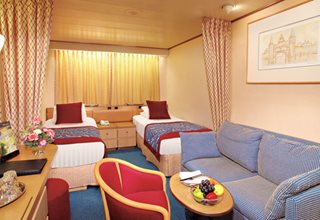
Category: N
Amenities- Daily housekeeping
- Complimentary 24-hour room service
- Elemis Aromapure soap, lotion, shampoo
- Luxurious bathrobes
- Hair dryers, makeup mirrors
- Generous storage
- Fresh fruit upon request
- Safe
- Ice service
- Shoeshine
- TV with On Demand movies, programming

Category: MM
Amenities- Daily housekeeping
- Complimentary 24-hour room service
- Elemis Aromapure soap, lotion, shampoo
- Luxurious bathrobes
- Hair dryers, makeup mirrors
- Generous storage
- Fresh fruit upon request
- Safe
- Ice service
- Shoeshine
- TV with On Demand movies, programming

Category: M
Amenities- Daily housekeeping
- Complimentary 24-hour room service
- Elemis Aromapure soap, lotion, shampoo
- Luxurious bathrobes
- Hair dryers, makeup mirrors
- Generous storage
- Fresh fruit upon request
- Safe
- Ice service
- Shoeshine
- TV with On Demand movies, programming

Category: L
Amenities- Daily housekeeping
- Complimentary 24-hour room service
- Elemis Aromapure soap, lotion, shampoo
- Luxurious bathrobes
- Hair dryers, makeup mirrors
- Generous storage
- Fresh fruit upon request
- Safe
- Ice service
- Shoeshine
- TV with On Demand movies, programming

Category: K
Amenities- Daily housekeeping
- Complimentary 24-hour room service
- Elemis Aromapure soap, lotion, shampoo
- Luxurious bathrobes
- Hair dryers, makeup mirrors
- Generous storage
- Fresh fruit upon request
- Safe
- Ice service
- Shoeshine
- TV with On Demand movies, programming

Category: J
Amenities- Daily housekeeping
- Complimentary 24-hour room service
- Elemis Aromapure soap, lotion, shampoo
- Luxurious bathrobes
- Hair dryers, makeup mirrors
- Generous storage
- Fresh fruit upon request
- Safe
- Ice service
- Shoeshine
- TV with On Demand movies, programming

Category: I
Amenities- Daily housekeeping
- Complimentary 24-hour room service
- Elemis Aromapure soap, lotion, shampoo
- Luxurious bathrobes
- Hair dryers, makeup mirrors
- Generous storage
- Fresh fruit upon request
- Safe
- Ice service
- Shoeshine
- TV with On Demand movies, programming
Elegant staterooms feature luxurious bedding, premium massage showerheads, a porthole or a window and fresh fruit upon request.
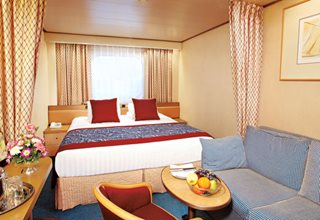
Category: HH
Amenities- Daily housekeeping
- Complimentary 24-hour room service
- Elemis Aromapure soap, lotion, shampoo
- Luxurious bathrobes
- Hair dryers, makeup mirrors
- Generous storage
- Fresh fruit upon request
- Safe
- Ice service
- Shoeshine
- TV with On Demand movies, programming

Category: H
Amenities- Daily housekeeping
- Complimentary 24-hour room service
- Elemis Aromapure soap, lotion, shampoo
- Luxurious bathrobes
- Hair dryers, makeup mirrors
- Generous storage
- Fresh fruit upon request
- Safe
- Ice service
- Shoeshine
- TV with On Demand movies, programming

Category: G
Amenities- Daily housekeeping
- Complimentary 24-hour room service
- Elemis Aromapure soap, lotion, shampoo
- Luxurious bathrobes
- Hair dryers, makeup mirrors
- Generous storage
- Fresh fruit upon request
- Safe
- Ice service
- Shoeshine
- TV with On Demand movies, programming

Category: FF
Amenities- Daily housekeeping
- Complimentary 24-hour room service
- Elemis Aromapure soap, lotion, shampoo
- Luxurious bathrobes
- Hair dryers, makeup mirrors
- Generous storage
- Fresh fruit upon request
- Safe
- Ice service
- Shoeshine
- TV with On Demand movies, programming

Category: F
Amenities- Daily housekeeping
- Complimentary 24-hour room service
- Elemis Aromapure soap, lotion, shampoo
- Luxurious bathrobes
- Hair dryers, makeup mirrors
- Generous storage
- Fresh fruit upon request
- Safe
- Ice service
- Shoeshine
- TV with On Demand movies, programming

Category: EE
Amenities- Daily housekeeping
- Complimentary 24-hour room service
- Elemis Aromapure soap, lotion, shampoo
- Luxurious bathrobes
- Hair dryers, makeup mirrors
- Generous storage
- Fresh fruit upon request
- Safe
- Ice service
- Shoeshine
- TV with On Demand movies, programming

Category: E
Amenities- Daily housekeeping
- Complimentary 24-hour room service
- Elemis Aromapure soap, lotion, shampoo
- Luxurious bathrobes
- Hair dryers, makeup mirrors
- Generous storage
- Fresh fruit upon request
- Safe
- Ice service
- Shoeshine
- TV with On Demand movies, programming

Category: DD
Amenities- Daily housekeeping
- Complimentary 24-hour room service
- Elemis Aromapure soap, lotion, shampoo
- Luxurious bathrobes
- Hair dryers, makeup mirrors
- Generous storage
- Fresh fruit upon request
- Safe
- Ice service
- Shoeshine
- TV with On Demand movies, programming

Category: DA
Amenities- Daily housekeeping
- Complimentary 24-hour room service
- Elemis Aromapure soap, lotion, shampoo
- Luxurious bathrobes
- Hair dryers, makeup mirrors
- Generous storage
- Fresh fruit upon request
- Safe
- Ice service
- Shoeshine
- TV with On Demand movies, programming

Category: D
Amenities- Daily housekeeping
- Complimentary 24-hour room service
- Elemis Aromapure soap, lotion, shampoo
- Luxurious bathrobes
- Hair dryers, makeup mirrors
- Generous storage
- Fresh fruit upon request
- Safe
- Ice service
- Shoeshine
- TV with On Demand movies, programming

Category: C
Amenities- Daily housekeeping
- Complimentary 24-hour room service
- Elemis Aromapure soap, lotion, shampoo
- Luxurious bathrobes
- Hair dryers, makeup mirrors
- Generous storage
- Fresh fruit upon request
- Safe
- Ice service
- Shoeshine
- TV with On Demand movies, programming
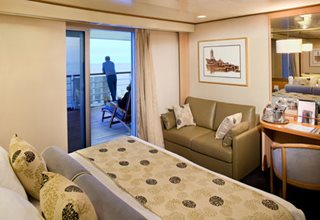
Category: CA
Amenities- Daily housekeeping
- Complimentary 24-hour room service
- Elemis Aromapure soap, lotion, shampoo
- Luxurious bathrobes
- Hair dryers, makeup mirrors
- Generous storage
- Fresh fruit upon request
- Safe
- Ice service
- Shoeshine
- TV with On Demand movies, programming
Spacious staterooms have a private balcony, whirlpool bath (some with shower only) and more.
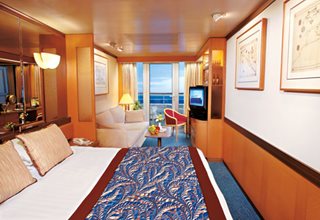
Category: BC
Amenities- Daily housekeeping
- Complimentary 24-hour room service
- Elemis Aromapure soap, lotion, shampoo
- Luxurious bathrobes
- Hair dryers, makeup mirrors
- Generous storage
- Fresh fruit upon request
- Safe
- Ice service
- Shoeshine
- TV with On Demand movies, programming
- Binoculars
- Whirlpool bath

Category: BB
Amenities- Daily housekeeping
- Complimentary 24-hour room service
- Elemis Aromapure soap, lotion, shampoo
- Luxurious bathrobes
- Hair dryers, makeup mirrors
- Generous storage
- Fresh fruit upon request
- Safe
- Ice service
- Shoeshine
- TV with On Demand movies, programming
- Binoculars
- Whirlpool bath

Category: B
Amenities- Daily housekeeping
- Complimentary 24-hour room service
- Elemis Aromapure soap, lotion, shampoo
- Luxurious bathrobes
- Hair dryers, makeup mirrors
- Generous storage
- Fresh fruit upon request
- Safe
- Ice service
- Shoeshine
- TV with On Demand movies, programming
- Binoculars
- Whirlpool bath

Category: AA
Amenities- Daily housekeeping
- Complimentary 24-hour room service
- Elemis Aromapure soap, lotion, shampoo
- Luxurious bathrobes
- Hair dryers, makeup mirrors
- Generous storage
- Fresh fruit upon request
- Safe
- Ice service
- Shoeshine
- TV with On Demand movies, programming
- Binoculars
- Whirlpool bath

Category: A
Amenities- Daily housekeeping
- Complimentary 24-hour room service
- Elemis Aromapure soap, lotion, shampoo
- Luxurious bathrobes
- Hair dryers, makeup mirrors
- Generous storage
- Fresh fruit upon request
- Safe
- Ice service
- Shoeshine
- TV with On Demand movies, programming
- Binoculars
- Whirlpool bath
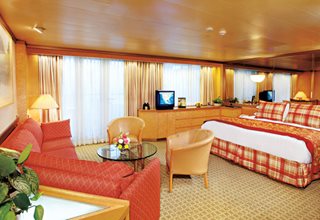
Category: SA
Amenities- Daily housekeeping
- Complimentary 24-hour room service
- Elemis Aromapure soap, lotion, shampoo
- Premium bathrobes, slippers
- Hair dryers, makeup mirrors
- Generous storage
- Fresh fruit upon request
- Safe
- Ice service
- Shoeshine
- TV with On Demand movies, programming
- Fresh flowers
- One-Touch concierge service
- Whirlpool bath
- In-suite coffee, espresso
- Complimentary laundry
- Pre-dinner hors d'oeuvres served in suite
- Welcome glass of sparkling wine
- Priority boarding for tender ports, priority dining/seating requests, special disembarkation service
- High tea in suite on request
- Binoculars
- Exclusive tote bag

Category: SB
Amenities- Daily housekeeping
- Complimentary 24-hour room service
- Elemis Aromapure soap, lotion, shampoo
- Premium bathrobes, slippers
- Hair dryers, makeup mirrors
- Generous storage
- Fresh fruit upon request
- Safe
- Ice service
- Shoeshine
- TV with On Demand movies, programming
- Fresh flowers
- One-Touch concierge service
- Whirlpool bath
- In-suite coffee, espresso
- Complimentary laundry
- Pre-dinner hors d'oeuvres served in suite
- Welcome glass of sparkling wine
- Priority boarding for tender ports, priority dining/seating requests, special disembarkation service
- High tea in suite on request
- Binoculars
- Exclusive tote bag
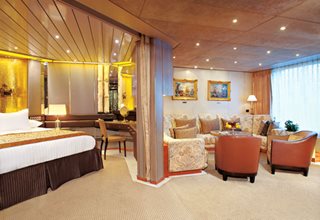
Category: PS
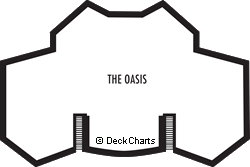
| Symbol | Description |
|---|---|
 | Shower only |
 | Bathtub & shower |
 | 2 lower beds convert to 1 queen-size bed (no sofa bed) |
 | Triple (2 lower beds, 1 sofa bed) |
 | Quad (2 lower beds, 1 sofa bed, 1 upper) |
 | Partial sea view |
 | These staterooms have portholes instead of windows |
 | 2 lower beds not convertible to a queen-size bed |
 | Fully obstructed view |
 | Suites B7088, B7087, B6228, and B6225 and stateroom EE3429 are fully accessible, roll-in shower only |
 | Suite SA7034 is fully accessible with single side approach to the bed, bathtub, and roll-in shower; Staterooms DA6104, G1805, and G1804 are fully accessible with single side approach to the bed, roll-in shower only |
 | Staterooms EE3396, EE3391, HH3431, HH3430, E2702, L2700, J2555, J2554, G2500, FF1964, FF1955, G1807, and G1806 are ambulatory accessible, roll-in shower only |
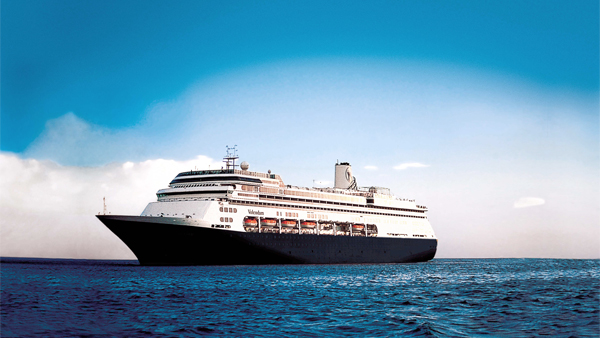
- Ship Name: Volendam
- Year Built: 1999
- Year Refurbished: 2014
- Year Entered Present Fleet: 1999
- Ship Class: R
- Maximum Capacity: 1,837
- Number of Passenger Decks: 10
- Number of Crew: 615
- Officers' Nationality: International
- Ocean-View without Balcony: 385
- Total Inside Staterooms: 134
- Tonnage (GRT): 61,214
- Capacity Based on Double Occupancy: 1,432
- Country of Registry: Netherlands
- Total Staterooms: 716
- Suites with Balcony: 197
- Crew/Hotel Staff Nationality: International
Costco Member Reviews

Available Dates & Prices
Terms & Conditions
*Price shown is per person based on double occupancy and is valid for select stateroom categories only. Click on the Terms & Conditions link below for details.
†One Digital Costco Shop Card per room/stateroom, per stay. The exact amount of the Digital Costco Shop Card will be calculated during the booking process. The Digital Costco Shop Card promotion is nontransferable and may not be combined with any other promotion. A Digital Costco Shop Card will arrive by email approximately 10 days after the start of your cruise. Click on the Terms & Conditions link below for additional information.
Ship's registry: The Netherlands
Digital Costco Shop Card
This booking includes a Digital Costco Shop Card which will arrive by email one to two weeks after you return from your vacation. The Digital Costco Shop Card is a convenient payment option in our warehouses and on Costco.com.

